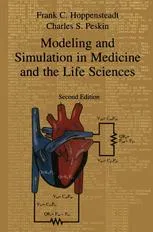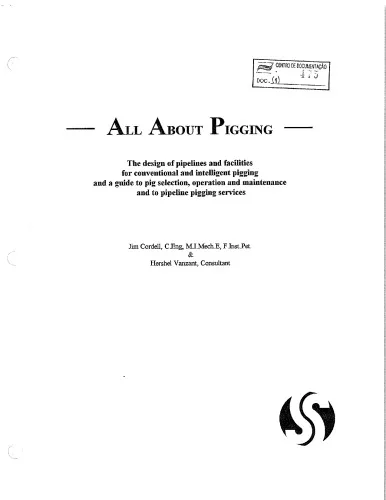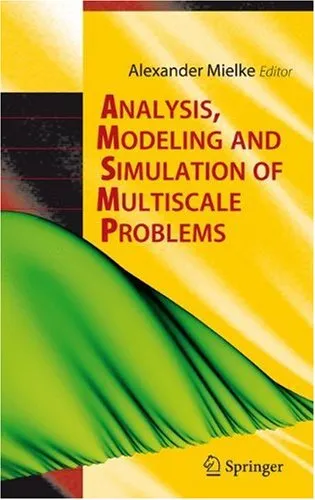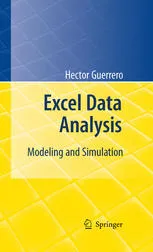Design and Analysis of Experiments
4.6
Reviews from our users

You Can Ask your questions from this book's AI after Login
Each download or ask from book AI costs 2 points. To earn more free points, please visit the Points Guide Page and complete some valuable actions.Related Refrences:
Introduction to "Design and Analysis of Experiments"
"Design and Analysis of Experiments" by Klaus Hinkelmann and Oscar Kempthorne is a seminal work in the field of statistical methodology. Through its detailed approach to experimental design and analysis, the book provides an indispensable resource for researchers, statisticians, and students striving to understand the underlying principles and applications of experiment planning and execution. From theoretical foundations to practical implementation, this book sets a benchmark for clarity, precision, and depth in the topic of designing experiments.
Detailed Summary of the Book
The book is structured to serve as a comprehensive guide to the multifaceted discipline of experimental design and its statistical interpretations. It begins by introducing foundational principles, such as randomization, replication, and blocking, which are essential to the formulation of unbiased and accurate experiments. The earlier chapters delve into the historical context of experimentation, showcasing how systematic inquiry evolved into the rigorous analytical methods we use today. This foundation is critical for understanding the theoretical framework that underpins experimental design.
As the book progresses, it explores various types of experimental designs, including completely randomized designs (CRD), randomized block designs (RBD), factorial experiments, and Latin square designs. It provides detailed explanations and examples, emphasizing the specific applications and nuances of these designs. Statistical models are introduced to complement these designs, allowing readers to analyze experimental data effectively.
A significant portion of the book is dedicated to factorial experiments, highlighting their importance in understanding the interactions between variables. Moreover, advanced topics, such as split-plot designs and response surface methodology, are covered in later sections to provide deeper insights into complex experimental setups. Throughout, the authors stress the importance of efficiency, accuracy, and resource optimization in experiment design, making the book immensely practical and applicable to real-world scenarios.
Key Takeaways
- Understand the core principles of experimental design, including randomization, replication, and blocking.
- Learn about the appropriate use of different experimental designs, such as completely randomized and factorial designs, to suit varying research contexts.
- Gain proficiency in statistical analysis techniques to interpret experimental data accurately and effectively.
- Discover how to manage resources efficiently while improving the reliability and validity of experimental results.
- Explore advanced concepts like confounding, interaction effects, and response surface methodology.
Famous Quotes from the Book
"The design of the experiment should ensure that statistical analysis will yield accurate and precise conclusions with the smallest possible expenditure of resources."
"Often, good design is more about asking the right questions and framing the problem appropriately than simply gathering data."
"Factorial designs not only economize resources but also reveal the interactions between factors, which are often more instructive than the main effects themselves."
Why This Book Matters
"Design and Analysis of Experiments" is more than just a textbook; it is a cornerstone reference for anyone involved in statistical experimentation. The book stands out for its balance between theory and application, catering to both beginners and advanced researchers. For students, it serves as an accessible educational tool, while professionals in fields like agriculture, engineering, medicine, and social sciences rely on it for guidance in planning and analyzing experiments.
In a world increasingly driven by data and evidence-based decision-making, the ability to design effective experiments is an invaluable skill. By providing the tools needed to conduct statistically sound and ethically responsible research, this book empowers readers to tackle real-world problems with confidence and competence. Its breadth and depth make it an enduring classic and a must-have resource for anyone in the field of experimental design and analysis.
Free Direct Download
You Can Download this book after Login
Accessing books through legal platforms and public libraries not only supports the rights of authors and publishers but also contributes to the sustainability of reading culture. Before downloading, please take a moment to consider these options.
Find this book on other platforms:
WorldCat helps you find books in libraries worldwide.
See ratings, reviews, and discussions on Goodreads.
Find and buy rare or used books on AbeBooks.
1366
بازدید4.6
امتیاز0
نظر98%
رضایتReviews:
4.6
Based on 0 users review
Questions & Answers
Ask questions about this book or help others by answering
No questions yet. Be the first to ask!














